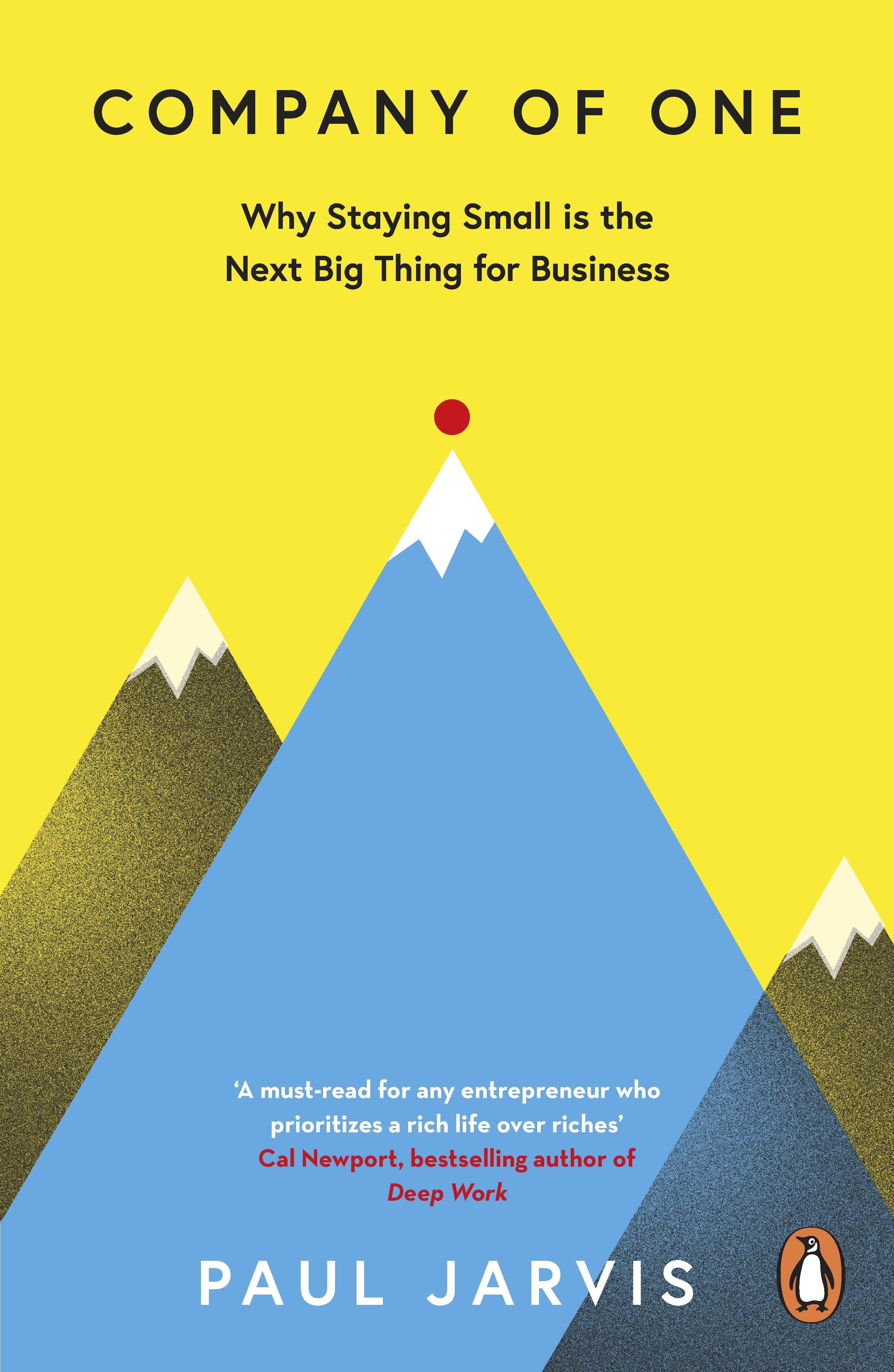Company of One
up:: Books

[!even-columns]
About
- Type:nonfiction
- [Author:: Paul Jarvis]
- [pages:: 224]
- [ddc:: 658.022]
- [Year published:: 2019]
Reading
- [status:: read]
- [rating:: 4.75]
- [added:: 2023-01-21]
- [started:: 2023-10-16]
- [read:: 2023-11-05]
Links
🛒 [kindle:: https://www.amazon.com/gp/aw/d/B07FQ2PFNN/ref=tmm_kin_swatch_0?ie=UTF8&qid=1692527795&sr=8-1] 🏫 [library:: ] [thumbnail:: “https://cdn2.penguin.com.au/covers/original/9780241470466.jpg”] [id:: gJZlDwAAQBAJ]
Recommended by Cal Newport.
Review/Reflection
I really liked this book.
I felt myself nodding along and frequently speaking notes into the Apple Watch as I read to the audiobook. A lot resonated with me: Don’t aim to go exponential, just improve your craft and serve your customers. It is a human-centered counterpoint to the growth-driven culture around us.
Each chapter was filled with relevant and interesting advice.
Notes
- financial steps
- Living expenses
- Runway buffer
- Reinvest into company (better than 3% return) - or, if no need to grow: index funds
-
Pay yourself the average of the last twelve months, minus 20-30% taxes.
-
Have terms of service before users pay. Separate your person from your company
-
Make a calculation of the time I wanna spend on a project for a month, my hourly rate and how expensive it would be for how many customers. I can increase prices also to reduce customers, for example if hosting would become to expensive.
-
Look at popular Obsidian feature requests and build that plugin.
-
Start with relationships and then a small product.
-
Start a company of one:
- Do free consulting for people in your field. You give your services, they give you their knowledge. Learn about what their problems are. Build relationships.
- Share this knowledge in a blog or book, or create your own product to solve this problem.
-
Build off an existing product. This way you don’t have to explain what your product is, just explain why it does a job better. For example mattress companies don’t say it’s a ‘rectangular foam thing’ but call it ‘mattress’ and can compare to other mattress manufacturers
-
If you aren’t embarrassed by your first launch, you have launched to late.
-
Instead of spending resources on advertisement, spent those resources on customer satisfaction
-
One way to build personal relationship with customers is to send personalised videos. When ever in new user signs up send a message that is a video which addresses them by name.
-
Customer support tickets very valuable feedback if there are multiple bug reports on the same thing then do a better way at teaching the customers how to use that feature if there are multiple future requests on the same topic, then make an effort to make that your next user lead innovation
-
Customer service really matters. this connects to prioritising retention over acquisition. If your customers are happy, they are gonna talk to other people about it.
-
Make decisions based on actual profit, not projected profit. Buying an app icon now because I hope I’ll make money is unwise.
-
Minimum Viable Profit: every minus you spend being set up is a minute you aren’t making money. Profit only happens when the profit covers the founder’s time.
-
Run a trust-centered business
-
Follow up a few weeks/months after purchase. Ask for testimonials, and remind to refer.
-
Wear clothes in stages: office —when worn out—>casual—>garden work—>rag
-
Focus on retention, rather than acquisition. The metric for how many customers renew is more important than the metric off. How many new customers you get on
-
Do your work and double prices until the demand is just slightly above the work that you can do. When you get more work, don’t take on more people but increase the prices are too the work mattress you are capacity
-
Yes, we set lower limits for goals for example where you want to get 200 new subscribers for email this week, but what if we also said upper limits we want to hundred subscribers not more than 400 this insures that we can grow at a sustainable space, and not fall into the trap of growing too quickly and scaling to harshly
-
Radically question complexity
-
This could be a helpful model for saving where you want to save $1000 per week, but no more than 1500
-
Business of one is about finding one customer, and who is willing to pay and helping them and then doing it again and then again
-
Focus on surfing your existing customers, not on infinite growth
-
You don’t want your profit to be dependent on the time that you spent on the business.
-
Profit should happen outside of time for a freelancer profit is dependent on time, but for smart company off once it is not dependent on time app
-
Growth isn’t always the smartest response to business problem, or even the best business strategy at all
-
You don’t want your income to be connected to the amount of work you put in. Either create a product, which makes money without your doing. Or, raise your prices as you get better and better, and demand increases.